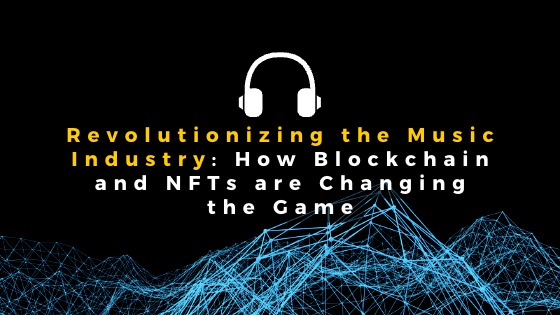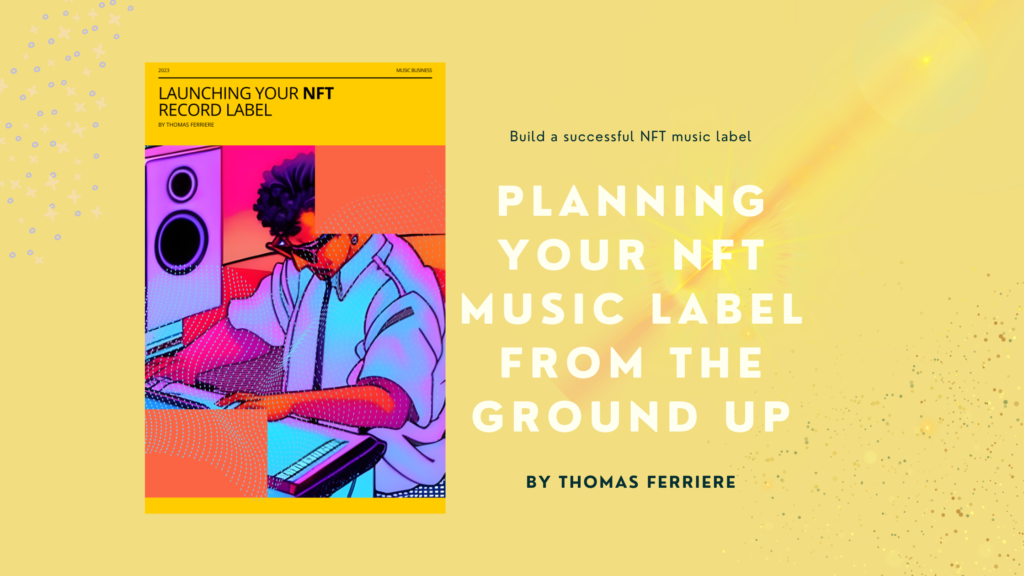
|
Check out our new audio content!
Getting your Trinity Audio player ready...
|
The music industry is constantly evolving, and new technologies are emerging that have the potential to change the way we consume and monetize music. Two of the most promising technologies in this regard are blockchain and non-fungible tokens (NFTs).
Blockchain Technology in the Music Industry.
Blockchain technology, which was first introduced as the underlying technology behind cryptocurrencies like Bitcoin, is a decentralized digital ledger that allows for secure and transparent transactions. In the music industry, blockchain technology has the potential to revolutionize the way musicians are attributed for their work and compensated for its use.
Imagine having the power to take control of your music career and say goodbye to the hassle of middlemen holding you back. Decentralized streaming platforms powered by blockchain technology give musicians like you the freedom to do just that.
Now, it’s important to note that record labels can still play a valuable role in building an artist’s career. They can provide resources, mentorship, and industry connections to help artists navigate the music industry and gain more visibility. However, with decentralized streaming, musicians can connect with their fans and monetize their music directly without intermediaries.
No more dealing with the hassle of record labels and distributors; you’ll be able to directly connect with your fans and earn more revenue from your music. Plus, with transparent royalty distribution, you’ll know exactly where your earnings come from.
But it’s not just about the money; decentralized platforms also bridge the gap between musicians and their audiences. You’ll be able to connect with your fans in new and exciting ways and build a community around your music.
And let’s not forget blockchain technology allows for a point of origin to be established for music creators, meaning you’ll be able to prove your ownership of your creations and protect your rights as an artist.
So, decentralized streaming is definitely worth considering whether you’re just starting or you’re a seasoned pro. It’s a game changer for the music industry, and you deserve to be a part of it.
Examples of blockchain projects in the music industry:
- Musicoin: a platform that allows musicians to get paid directly from fans.
- Mycelia: a project led by musician Imogen Heap, working to create a decentralized music ecosystem using blockchain technology.
- eMusic: operates as a music distribution and royalty management platform that rewards artists and fans.
- BitSong: a global music community with a trustless marketplace for music streaming, Fan Tokens, and NFTs powered by the BTSG token.
- Audius : a decentralized music streaming platform that allows musicians to share their music and directly connect with their fans.
NFTs in the Music Industry.
On the other hand, NFTs (non-fungible tokens) is a type of digital asset that can be bought, sold, and traded on blockchain platforms; they are unique and non-interchangeable; they are used to tokenize digital assets such as music, art, and videos. In the music industry, NFTs can be used to authenticate and sell ownership of digital music files, allowing musicians to monetize their work in new ways. NFTs can be used to sell exclusive rights to a digital music file, like a limited release, or as a collectible item for fans.
Examples of musicians using NFTs:
- Snoop Dogg: dropped an NFT collection to accompany his latest album, B.O.D.R. A total of 25,000 NFTs were made available through Gala Market, each one featuring exclusive virtual and tangible perks such as bonus tracks, making it a unique and exciting way for fans to own and engage with the album.
- Grimes: Canadian artist Grimes sold an NFT collection, “WarNymph Collection” in March 2021, which included digital art, music videos, and 3D avatars; she sold the collection for $6 million, making it one of the most expensive NFT sales to date.
- DJ 3LAU: American DJ and electronic music producer Justin Blau used NFTs to release his album “Ultraviolet” in April 2021.
- Muse: Made history by becoming the first act to top the UK charts with an album sold as an NFT (non-fungible token) in 2022.
In the music industry, NFTs can be used to authenticate and sell ownership of digital music files, allowing fans to experience music in new and exciting ways.
Access to Exclusive Content:
One of the biggest benefits of NFTs for music fans is the ability to access exclusive content that is unavailable to the general public. Musicians can use NFTs to sell limited music releases, such as demos, live recordings, or remixes. Fans who purchase these NFTs will be the only ones with access to this exclusive content.
Collectible Items:
NFTs can also be used as collectible items for music fans. Musicians can create limited-edition NFTs that include digital art, music videos, or even 3D avatars of themselves. These NFTs can be bought, sold, and traded like traditional collectibles, and they offer fans a way to connect with the artist and their work in a unique and personal way.
Live Events:
Another potential use of NFTs for music fans is the ability to attend live events. Musicians can use NFTs to sell tickets to virtual or in-person events, and fans can use their NFTs to gain entry. This not only allows fans to attend events they may not have been able to otherwise, but it also provides a way for musicians to monetize their live performances.
The music industry is in a state of flux, and blockchain technology is poised to play a big role in shaping its future. Decentralized streaming platforms offer musicians more control over their music, more transparency in royalty distribution, and the ability to connect directly with their fans. NFTs, in particular, have opened up a new world of possibilities for musicians to monetize and promote their work in unique ways. It’s an exciting time to be a musician, and it’s worth considering how blockchain-based solutions could benefit your career. The possibilities are endless, from chart-topping albums sold as NFTs to virtual and tangible extras that come with NFT collections. It’s time to embrace the future and take advantage of blockchain technology’s opportunities.
